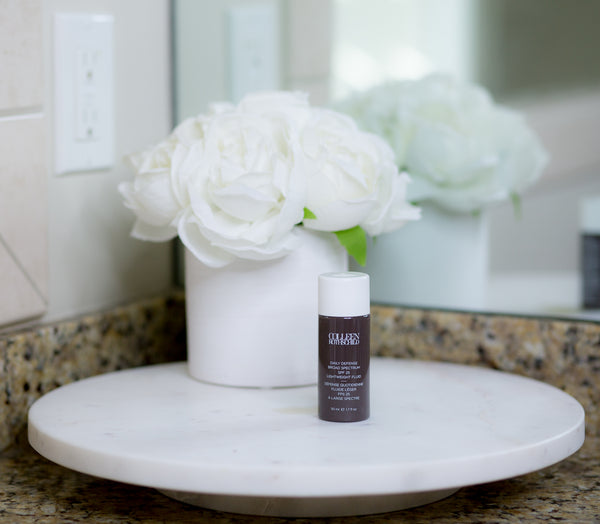Sunscreen: Everything You Need To Know To Protect Yourself

Summer is the season for fun in the sun - lounging by the pool, a day at the beach, or biking in the park. My husband Stan and I just returned from the most amazing two weeks in Greece. We spent most of the trip outdoors, exploring the winding roads of Santorini and relaxing by a pool in Athens. I was quickly reminded of the importance of my daily sunscreen!
(Would you guys be interested in a recap of my trip to Greece? Let me know in the comments below!)
I do my best to avoid sun exposure when I can, but staying in the shade isn't always practical. And whether you're traveling for summer vacations or just spending time with family, more time outside means more sun exposure.
Properly applying a sunscreen with effective ingredients is a MUST to protect your skin from the damaging ultraviolet rays. Tanned skin may look great in your 20s, but trust me, if you wan't to preserve your skin's youthful tone and texture, protection from the sun is essential.
So today, I thought I would talk about some important things to look for in a sunscreen - and how to properly protect you and your family in the hot summer sun.
What’s in an SPF?
SPF - or "sun protection factor" - is the level of protective filters against harmful UVA and UVB rays.
UVA rays tan your skin. They penetrate deep into the skin which can cause premature wrinkles, fine lines, and other signs of photo-aging. These UVA rays have been linked to skin cancer, while UVB rays cause redness and sunburn on the skin’s surface.
Applying an SPF sunscreen of 15 or higher is recommend to defend against skin damage. However, an SPF of 25+ is ideal for most skin and provides 97% protection against the damaging rays of the sun.
 photo by: @courtney_shields
photo by: @courtney_shields
What is "Broad Spectrum"?
Broad spectrum sunscreen is formulated to protect you from UVA and UVB rays. So be sure to look for it on the label to know you’re getting optimal protection for your skin.
Sunscreen isn’t just for the beach! Even if you're spending lots of time in your car or near a window, you’re skin is vulnerable to the sun’s damaging ultraviolet rays. Applying a broad spectrum sunscreen should be a part of your daily skin care routine in every season, even when it’s overcast or rainy. It’s a simple step to help your skin age gracefully, preventing the signs of photo-aging.
Which active ingredients should I look for?
I know that scanning ingredient lists can be a bit of a pain, but checking out the active ingredient section on the back of your sunscreen can help narrow down the myriad of choices available to you.
Consider using a sunscreen formulated with ZINC OXIDE or TITANIUM DIOXIDE. Both are active or “physical” minerals that form a barrier over the skin that absorb, reflect, and scatter UV rays. When UV rays come in contact with your skin, they bounce off this barrier, blocking penetration into the skin.
Both Zinc Oxide and Titanium Dioxide are safe for sun exposure, and they typically do not cause breakouts, which makes both of these minerals better for sensitive or reactive skin. Zinc Oxide especially protects sensitive skin against UV rays without causing irritation. Plus, its antimicrobial and naturally soothing properties are a bonus!

photo by: @cyndispivey
How should I apply sunscreen?
To receive the full protection from your sunscreen, apply 1 ounce (about 2 tablespoons) to your skin 15 to 30 minutes before sun exposure. Be sure to cover those easy-to-miss areas like your ears, back of your legs, and your neck. It’s highly recommended that you apply sunscreen every 2 hours, even if your sunscreen offers longer protection. It’s always best to apply more often if you sweat or you’re in water.
No sunscreen blocks all UV rays, but by choosing a broad spectrum sunscreen and applying frequently, you can be assured your skin is well-protected.
And don't forget, it's best to replace your sunscreen every 12 months. That old tube from a few summers ago may not be as effective as it once was. So don't risk it!
Any last minute sun shielding tips?
Sunscreen alone may not always be enough to guard against UV rays. If you plan to spend an extended amount of time in direct sunlight, consider doing these things for the best chance of protecting your skin.
- Apply a lip balm with UV protection regularly
- Find a shady spot and rest frequently from direct sun exposure
- Wear a wide-brimmed hat to protect your face while you’re relaxing in the sun
- Invest in sun protective clothing or darker, tightly woven clothing
If you’re considering adding an SPF to your skin care regimen (and you should), the Daily Defense SPF 25 offers broad spectrum protection with the important Zinc Oxide mineral to protect your skin from harmful UV rays. Its ultra-lightweight, oil-free, and non-comedogenic properties make it perfect to wear alone or under your makeup. Antimicrobial and naturally soothing properties help keep premature skin-aging at bay. And a mineral-based blend of vitamin E and peptide complex promotes skin’s radiance and even tone while diminishing the appearance of fine lines and wrinkles.
It’s never too early to start protecting your skin. No sunscreen is 100% protective, but NOT applying a broad spectrum SPF sunscreen is risky business. A sunscreen with effective ingredients goes a long way in protecting your skin from overexposure to the sun, and preserves the radiant tone and texture of your skin’s surface.
Do you have other sunscreen questions? Please comment below. I’d love to hear from you!
xo
Colleen
2 comments
-
Lisa on
I would love to hear about your trip!
 photo by: @courtney_shields
photo by: @courtney_shields
Could you suggest the order to apply daily sunscreen if you also use your serum and moisturizer?